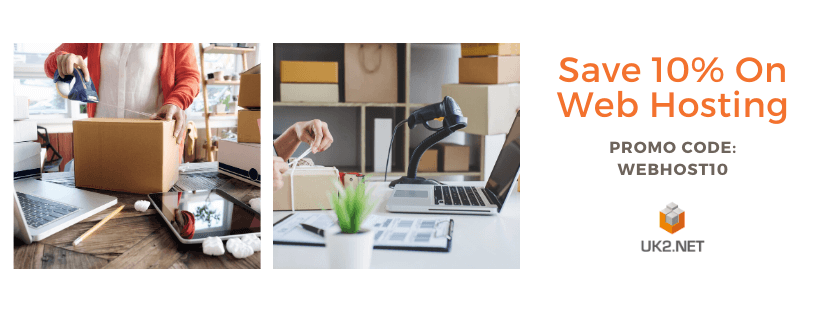Does Your Small Business Really Need A Website or Are Etsy & Facebook Enough?
It’s commonly stated that no business can afford to be without a website. Yet is this necessarily the case?
Every online business certainly needs an online presence, but a standalone website may be unnecessary for a startup enterprise being run out of someone’s spare room.
You might not need to launch a website to offer local services like ironing or window cleaning, and few home-based charities need ten proprietary email accounts or an image slideshow.
Ten years ago, no self-respecting amateur musician or artist would have been seen without their MySpace page, and today, Facebook has become the default option for anyone who doesn’t know their HTTP from their HTML. A Facebook for Business page can be assembled in less than five minutes, instantly plugging you into the world’s largest social network and offering a foolproof way to establish an online presence.
Additionally, online marketplaces like Ebay and Etsy make it easy for small businesses to operate without a dedicated website. However, is this the best choice for the future of your small business?
Probably not. Let us explain why…
Social Butterflies
Mark Zuckerberg would like you to think that you can skip a website and divert your traffic to Facebook. Despite repeated criticisms about the prevalence of fake news and the intrusiveness of its privacy policies, Facebook seems impervious to negative publicity.
There are more than 60 million businesses with dedicated Facebook pages. This figure might pale compared to the number of businesses with their own websites. But it’s still a hugely significant number. Blue-chip brands rub shoulders with sole traders on Facebook’s servers, while a third of site users regularly engage with brands. This often involves customer service, since social media channels are perceived to be far more direct than emailing a call centre or sending a message through a chatbot.
Search and ye shall find
Facebook wants to be a search engine and aggregator in its own right, keeping its users away from other industry giants like Google and Microsoft. Its search bar is positioned at the top left of every desktop page, with algorithmic analysis predicting results akin to conventional search engines. Results aren’t nearly as comprehensive or accurate as you’d get from Google and Bing, but the inclusion of “…nearby” results simplifies the process of looking for an unknown firm in a particular industry.
Close but not quite…
It’s fair to say Facebook won’t be troubling the major search engines any time soon, but if people know your brand or business name, a Facebook page does offer notable advantages:
It’s free.
Facebook sells vast amounts of user data to advertisers, and creating a business page generates additional information it can provide about you and your latest enterprise. That’s how Facebook can offer space on its servers at no cost.
It covers the basics.
If you don’t need ecommerce functionality or interactive timelines, a Facebook page will provide the essentials. Your contact details, Facebook stats, and previous posts are all uniformly displayed in a clean one-page view.
It’s user friendly.
No programming skills or HTML knowledge are required to launch a business page on Facebook. You don’t even need any design skills. Populating a page is simplicity itself, and the page stays live for as long as you wish.
It’s very popular.
Almost a third of the world’s population is on Facebook, with near-blanket coverage in many Western countries. That means people are already on the site; all you have to do is use the right tags and terms to ensure they find you.
Its advertising algorithms are very clever.
As you might expect for a business funded by ad revenue, Facebook offers extensive advertising opportunities. These place pay-per-click ads in front of your chosen demographics, from age and gender to interests.
It’s not all likes and shares…
However, there are obvious drawbacks to relying solely on a Facebook for Business page. As stated above, the Search option lags far behind arch-rival Google in both depth and relevance – it’s not uncommon for long-abandoned pages to be among the top results.
And while many people have no issue uploading information that will be supplied to advertisers around the world, others resent Facebook’s belligerent approach to data harvesting and resale.
More pertinently from a corporate perspective, these are some of the drawbacks involved in pinning your online presence to Facebook’s mast:
It seems amateurish.
The simplicity alluded to in point 3 above is a double-edged sword. Because anyone can assemble a Facebook page, there’s no sense of professionalism. In fact, the generic presentation may imply you’re really an amateur.
Lack of ownership.
If you fall foul of Facebook’s labyrinthine guidelines, they can edit or remove your page as they see fit. Facebook controls your content – and the page’s existence – while its customer service is infamous for not resolving queries.
Lack of functionality.
A Facebook page is fine for providing basic corporate information, but it’s hopeless for ecommerce. It’s good at accepting comments, but awful as a forum or message board. Its one-page design imposes many restrictions.
Every page looks the same.
There’s no scope for customisation, and your page is as much an ad for Facebook as it is for your business. Individuality extends to a logo or background photo at best, which creates a dull and instantly forgettable online presence.
Poor reporting statistics.
Using platforms like Moz or SEMrush on a website reveals a treasure trove of visitor information. Facebook has no in-depth reporting on page visitors, and the desultory Notifications often serve no practical purpose.
SEO Woes
Ultimately, it’s hard to recommend a Facebook for Business page as a straight replacement for a company website. It’s simply too limited and proprietary to establish the trust and credibility inferred by a dedicated website. And though Google and Bing display Facebook pages prominently in their listings, a standalone website has far more scope for performing strongly in results.
You can’t adjust the title tags on a Facebook page, or choose a powerful domain name relating to your chosen industry. You won’t be able to encourage search engines to trawl it with a robots.txt file or XML sitemap, and proprietary email addresses aren’t an option.
Unless someone searches for your brand name (or it has a set of search criteria no other company can match), they’re unlikely to find your Facebook page through a generic web search.
Don’t conclude that a Facebook for Business page is worthless, however. Having a presence on the world’s most popular social media site still provides a significant source of free advertising, as well as offering an invaluable channel for generating social media traffic and activity.
The solution: A unique domain and stylish website.
Create a foundation for your business with a domain that matches your brand and a website to drive traffic and boost sales.
A Guide To Finding The Perfect Domain Name
All online business starts with a domain name, but how do you pick the right one for you?
As things stand in the world of the web, there are currently over 1,780,000,000 websites live worldwide according to Internet Live Stats. As we’ve covered, the internet is growing existentially, and businesses that are lacking a web presence are missing out on a huge chunk of potential customers from around the world.
When getting started online the first thing you need to do is register a domain name. A domain name is like a signpost on the map of the web. Your customers can’t visit your site without it.
Each domain name corresponds to an IP address, which is assigned to a server when you purchase a web hosting solution. It is possible to register a domain name without web hosting to power it up, but anyone hoping to launch a website using their domain name needs a server to store their web data and serve the website to visitors around the world. Those entities who reserve domain names without web hosting to set them live are known as domain squatters.
Domain must-haves
So aside from the technical stuff, there are a few things you need to remember when registering a domain name:
Keep it short and sweet
The shorter the domain name, the better. The reason? Your site visitors will find it easier to remember a shorter, sharper domain name, and are less likely to misspell your domain name on the hunt for your website. Keeping the name short is recommended, though it is also important that the domain name still makes sense. The human brain finds nonsense much harder to remember than sensical words.
Remember your brand DNA
All of your business operations should centre around your brand DNA. Your domain name is no exception to this rule. If your company is a formal business, keep things corporate in your domain name while keeping it short.
A trick to cutting your domain name down is to register a new generic top-level domain (gTLD). Many industry-specific domain names are now available to register as an alternative to a .com, .co.uk or .net. In the plumbing business? Why not register yourbusiness.plumbing. Likewise, are you a caterer? Perhaps yourbusiness.catering is available where the .com alternative is not. gTLDs are a great way of sticking to your brand DNA and being specific about your product or services.
Make it relevant
First off, you should always try to register your brand name as your domain name. This is standard practice on the web: think google.com, facebook.com, and apple.com!
Try to snap up the .com and the .co.uk of your brand name for security purposes – you don’t want anyone domain squatting on your brand’s domain, partly because this may affect your online business, but also because the legal proceedings to obtain your rightful domain can be lengthy.
There are hundreds of domain name endings on offer to represent your business, and they’re all right here on our domain names page! Once you’ve thought out a couple of domain name ideas, run them through our domain name search and register them as soon as possible. Next, all you need is a stunning website to capture your audience.
Next, we’ve created a guide to help you build an online store that drives conversions and completes sales.
5 Essentials For Your Ecommerce Website
Make the most of your business website by including these 5 elements.
No one likes a slow, clunky website. In fact, no one likes a slow, clunky website with a garish design. And absolutely no one likes a slow, clunky website with a garish design which is hard to navigate.
When you’re taking the online business plunge and setting up your very first website, there are a whole host of things you need to remember and include. There is also a range of decisions to be made, and you must give them some serious consideration if you hope to become a contender online.
The online business market is so incredibly competitive that you can’t afford to skip any of these elements:
1. A simple, memorable domain name.
Just as we’ve covered, before you can begin designing and building your website you need a web address. Your domain name is a vital part of your business website as many of your site visitors will find their way onto your site. It’s important to ensure it’s simple, memorable, and as short as possible. Domain names which are easy to remember and type into a browser bar will serve your site well. Consider registering a new generic top-level domain (gTLD) if your preferred .com is unavailable.
2. A pleasing layout.
What constitutes a ‘good-looking’ website is much disputed among web designers, entrepreneurs, and online shoppers alike. One tip we would give is to keep things simple and as neutral as possible. Garish colour schemes will send site visitors running from your site, and if there’s too much going on it can make it hard for customers to actually reach and get through the checkout.
3. A simple sitemap.
No matter how much money you throw at your website, it won’t be effective if it is difficult to navigate. Ensure that your customers can see exactly where they need to go to make their purchase. “Buy it now” and “add to cart” buttons should be prominent on each product profile and “checkout” should be available from every page.
4. Good quality content.
Content truly is king in the world of online business. Your business website should showcase every aspect of your organisation with relevant, informative content geared towards your customers. Your content will form a large part of your search engine optimisation efforts. Google will crawl your website to determine how useful it is for internet users and rank it accordingly. Make sure you provide valuable information that will be useful to your potential customers.
5. A powerful web hosting solution.
Website visitors will typically abandon a website if it takes longer than two seconds to load. You need a powerful web hosting solution to make sure your site loads at lightning speed. For small business websites, a shared hosting solution may be suitable. Although once your site gains popularity, a dedicated server will provide you with the resources you need to keep your site up and running smoothly around the clock.
To create a stunning site which works seamlessly across all devices automatically, check out our Online Shop Builder. With over 140 professionally designed templates and a simple drag-and-drop feature for easy customisation, Online Shop Builder is the ideal ecommerce site builder for your business.



